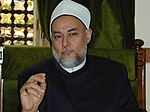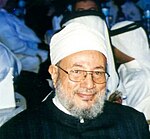Embassy from Amman

The message from Amman ( Arabic رسالة عمان, DMG Risālat ʿAmmān , English Amman Message ) is an Islamic interreligious initiative and public statement by high-ranking Islamic scholars, published on November 9, 2004 by King Abdullah II of Jordan and signed by a total of 552 Islamic scholars and personalities. Amman is the capital of the Hashemite Kingdom of Jordan . It calls for tolerance and unity in the Muslim world and calls on them to leave extremism aside . Its steering committee was chaired by Prince Ghazi bin Muhammad , a cousin of the Jordanian king.
The text was edited by Sheikh al-Tamimi , King Abdullah II's adviser on Islamic affairs, chief justice and chairman of the Fatwarate, in the presence of King Abdullah II during the festival of Lailat al-Qadr (Night of Determination) on November 9, 2004 in the Hashemiyya Mosque in the Tla al-Ali district in northwest Amman . The speech was broadcast simultaneously on Jordanian television and radio.
King Abdullah II asked three questions
In 2004, King Abdullah II of Jordan sent the following three questions to twenty-four eminent Muslim scholars representing all subgroups and schools of Islam worldwide:
- 1. Who is a Muslim ?
- 2. Is it permissible to declare someone an apostate ( takfīr )?
- 3. Who has the right to issue fatwas (legal opinions)?
Three-point rule
Subsequently, in July 2005, a three-point regulation was drawn up by 200 Islamic scholars from over 50 countries, which focuses on the following points:
(1) Recognition of the eight schools of law and thought (Sg. Maḏhab ) and the different currents of Islamic theology
- Hanafites ( Sunna )
- Hanbalites (Sunnah)
- Malikites (Sunnah)
- Shafi'ites (Sunnah)
- Ja'farites ( Shia , includes Twelve Shia and Ismaili )
- Zaidites (Shia)
- Ibadites
- Zahirites
(2) Prohibition to designate followers of the following directions as apostates :
- of the Ash'arite school (traditional Islamic theology)
- des Tasawwuf (Islamic mysticism)
- of true Salafism (school of thought)
(3) Prohibition of declaring (takfir) (or excommunicating) others recognized as Muslims as infidels
Fatwas of the ʿUlamā '
This is a list of the persons and organizations ( ʿUlamā ' ) that have created a fatwa in connection with the Amman Message (as listed on the official website):
Opinion of Jehan Sadat
“A few years ago I followed the publication of the so-called Amman Message with interest, which in my eyes symbolizes both the diversity and the unity of Islam. In 2004, King Abdullah II of Jordan sent three questions to twenty-four of the most important Muslim scholars in the world, representing all subgroups and schools of Islam worldwide: 1. Who is Muslim? 2. Is it permissible to declare an apostate (takfir)? 3. Who has the right to issue fatwas (legal opinions)? Based on the fatwas issued by these scholars - including the Sheikh of Al-Azhar, the highest Sunni authority, some of the most prominent Shiite ayatollahs and the most important religious leaders of Muslim countries - an international conference on Islam was held in Amman in July 2005 with two hundred of the the world's leading Islamic scholars. There these scholars, who came from different countries and traditions, made unanimous decisions on the three elementary questions. First, they confirmed the fundamental validity of all eight traditional and official schools of Islamic jurisprudence; second, they categorically condemned denouncing a Muslim as takfir; and third, they determined who had the right to issue fatwas in the name of Islam. Since then, the Amman Message has been signed by around five hundred scholars, sheikhs and heads of state, including Sunnis, Shiites, Sufis and representatives of all Muslim traditions. This is just one example of the many significant (and under-noticed in the West) measures by which the Umma distances itself from the brutal violence that is being carried out on its behalf. "
literature
- Hannelore Müller: Religions in the Middle East: Iraq, Jordan, Syria, Lebanon . 2009 ( online excerpt )
- Safaa M. Afifi El-Sheikh: Western Churches in the Image of Contemporary Egyptian and Arab Religious Scholars: A Contribution to the Open Letter to Pope Benedict XVI. (Doctorate from HU zu Berlin) Dissertation to obtain the academic degree of Doctor of Philosophy 2012 ( Online ; PDF; 1.8 MB)
- Jamal Al Shalabi ( Hashemite University , Zarqa , Jordan); Menawer Bayan Alrajehi ( Kuwait University , Kuwait City , Kuwait): " The Amman Message: Arab Diplomacy in the Dialogue of Civilizations (PDF; 130 kB)" - Online at eis.hu.edu.jo (Journal of US-China Public Administration, ISSN 1548-6591 , December 2011, Vol. 8, No. 12, 1375-1392)
- Jehan Sadat : My Hope for Peace , With a foreword by Helmut Schmidt , Hoffmann and Campe, 2009, ISBN 3-455-50126-5 ( online excerpt )
- The declaration of 138 - one signatory speaks (Dr. Murad Wilfried Hofmann ) - ev-akademie-boll.de
Web links
- ammanmessage.com (Official Website)
- jordanembassy.de (a) (PDF; 68 kB) (b) (Text of the message from Amman by Sheikh Izz-Eddine Al-Khatib Al-Tamimi , King Abdullah II's advisor for Islamic affairs on the website of the Jordanian Embassy)
- dradio.de: Between Progress and Sharia: Moderate Islamism and Democratization in the Kingdom of Jordan (by Susanne El Khafif)
- spiegel.de: We all pay the price (King Abdullah II in an interview with Spiegel)
- cnewa.org ( Catholic Near East Welfare Association website )
Videos
- Brief introduction on YouTube (English)
- The Global Relevance of the Amman Message - An Interfaith Dialogue on YouTube (Speech by Prince Ghazi bin Muhammad, King Hussein Mosque , Amman , March 12, 2013)
References and comments
- ↑ Safaa M. Afifi El-Sheikh, p. 150
- ↑ 27. Ramadan 1425 AH
- ↑ Born January 30, 1962 in Amman; Head of State of the Hashemite Kingdom of Jordan since February 7, 1999. - See also: King Abdullah: Our Last Best Chance: The Pursuit of Peace in a Time of Peril . 2011 ( online excerpt )
- ↑ See list of signatories at ammanmessage.com: Grand list of endorsements of the Amman Message and its three points
- ↑ P. Federico Lombardi SJ , head of the press office of the Holy See (according to zenit.org )
- ↑ Safaa M. Afifi El-Sheikh, p. 150 ("This is a call for understanding between the religions and an attempt to define the image of Islam in the non-Islamic world and to justify it.")
- ↑ dradio.de: Between Progress and Sharia: Moderate Islamism and Democratization in the Kingdom of Jordan (by Susanne El Khafif)
- ↑ On the "Declaration of Disbelief" ( takfīr ), see also Kufr .
- ↑ 'Three Points of the Amman Message' - The Amman Message summary - Official website
- ↑ ammanmessage.com (list of the names of the signatories of the International Islamic Conference)
- ↑ ammanmessage.com: The Three Points of The Amman Message V.1 , 2
- ↑ ammanmessage.com: Fatwas of the 'Ulama / فتاوى العلماء . - The list has been arranged and numbered according to the listing on the official website.
- ↑ instead of: ... Al-Najan
- ↑ Arabic حسين إسماعيل الصدر; instead of: Hassan ...
- ↑ see also Jawad Al-Khoei
- ↑ Arabic لحركة التوحيد والعمل الإسلامي
- ↑ Jehan Sadat : My Hope for Peace . With a foreword by Helmut Schmidt. 2009 ( online excerpt )
| Message from Amman (alternative names of the lemma) |
|---|
| Amman Message; Amman Embassy; Amman Embassy; Amman Embassy; Amman Embassy; Risalat Amman; Risalat 'Amman; Amman Letter;رسالة عمان; Risālat ʿAmmān; Risalat 'Amman |




